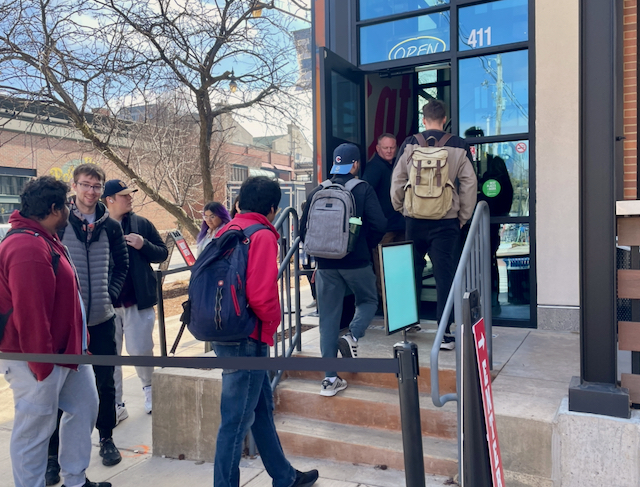Student population’s interests determine Campustown’s evolution

A doorman lets customers into Raising Cane’s on Feb. 28. The fast-casual restaurant opened on Green Street in Champaign, Illinois. Sydney Wood
The opening of the latest fast-casual restaurant to open near the University of Illinois drew crowds of people on Feb. 28, with some of them arriving before dawn.
Throughout the day, a seemingly never-ending line of people stood outside Raising Cane’s on Green Street in Champaign.
About 6 p.m., more than 60 people waited to enter the restaurant, the line wrapping around the corner and stretching down Fifth Street.
The location is the chain's first eatery in Champaign-Urbana. Its opening was preceded by numerous advertisements across the U of I campus and on social media.
The opening of the restaurant is one more example of Campustown driving economic development in Champaign, said Xander Hazel, the executive director of the Champaign Center Partnership.
“The Campustown district results in a significant chunk of tax revenue in the form of sales tax and local food and beverage tax,” Hazel said, “That tax revenue goes on to support city services.
“So that's the impact that the Campustown district has on the local community, at least in Champaign.”
Multiple businesses have opened in Campustown in the past year, Hazel said, most of them fast-casual restaurants. In the last several months, he said at least four businesses have opened on Green Street.
These places must often adapt to students’ interests, he said, which can be difficult because of how quickly the student population comes and goes.
“The student body changes every four years as well,” Hazel said, “And so I know that many businesses are always finding new ways to reach students to recover, I guess, from the turnover that happens.”
Some people in line on Feb. 28 said Raising Cane’s is another example of how Campustown is constantly transforming.
Mason Welch, an employee at the leasing company American Campus Communities on Green Street, ordered his food from Raising Cane’s online on Feb. 28 to avoid the long lines.
Welch said the businesses in Campustown are often affected by the interests of the students who occupy campus, which can be difficult as the student body replaces itself over the course of four years.
“I feel like four years is a big change as far as people coming in and out,” he said.
Rachel Lindquist, a University of Illinois senior, said the businesses on Green Street form their own community.
Like Welch, she said these restaurants must often find ways to connect with the changing student body.
“There's a lot of restaurants on Green Street that are, like, classic Champaign restaurants,” Lindquist said. “Like Bangkok Thai and Maize and Burrito King, things like those.
“But as the (student) generations evolve that come through here, I think they're trying to bring new things to Green Street to keep people interested.”
She said Campustown is a lot different from when she first moved to the area.
“Green Street has changed so much since my freshman year,” she said. “So many restaurants opening and closing. An astronomical amount of bubble tea places have opened since I've been here.
“So yeah, I definitely think Green Street is evolving.”
Another Raising Cane’s is set to open on North Prospect Avenue in Champaign in June.

